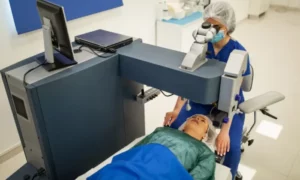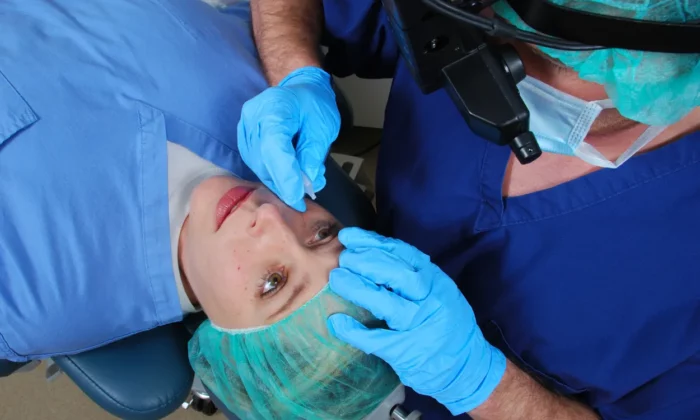Tired of those glasses? Ready to step into the world of laser vision correction? Navigating the landscape of laser surgeries can be a tad overwhelming, with so many names flying around. Among the top contenders are Contoura and PRK. But how do you know which one’s your ticket to crystal-clear vision? Fret not; we’ve got you covered. In this guide, we’ll discuss the differences and benefits of Contoura vs PRK, comparing their methods, safety, recovery time, and even the hit on your wallet. By the end, you’ll have a clear picture of which route might be best for your eyes. Let’s dive in!
Contents
Introduction to Contoura and PRK
When it comes to laser vision correction, Contoura Vision and PRK (Photorefractive Keratectomy) have emerged as popular choices among individuals wanting to say goodbye to glasses and contacts. Both techniques offer a pathway to enhanced vision, but they achieve this through distinct methods and technologies.
Contoura Vision: Advancing LASIK Techniques
Contoura Vision, often referred to as Topoguided LASIK, is a cutting-edge vision correction technique that’s winning hearts due to its promise of high-definition vision. What sets Contoura apart is its unparalleled precision. The technology behind it captures an impressive 22,000 unique images of the eye, creating an intricate corneal map. This map doesn’t just identify standard vision errors; it delves deeper, spotlighting minute imperfections. The surgeon uses this detailed map as a guide, sculpting the cornea to perfection. As a result, patients often experience enhanced clarity and contrast in their vision.
PRK: A Time-Tested Approach
 Long before LASIK gained mainstream popularity, PRK was setting the standards for laser vision correction. Here’s what you need to know:
Long before LASIK gained mainstream popularity, PRK was setting the standards for laser vision correction. Here’s what you need to know:
- Foundation of Refractive Surgery: PRK is considered one of the pioneers in refractive surgery, laying the groundwork for future innovations.
- No Flap, Just Precision: Unlike other laser vision correction methods, PRK doesn’t involve creating a corneal flap. Instead, the superficial layer of the cornea is gently removed, paving the way for the laser to reshape the underlying corneal tissue.
- The Procedure: Once the outermost layer is removed, a precise laser is used to reshape the cornea, addressing the specific vision issues. After the laser treatment, a protective contact lens is placed on the eye to aid in healing.
- Suitability: PRK is often chosen for patients with thinner corneas or those who engage in contact sports, as there’s no flap that could potentially get dislodged.
- Track Record: Over the years, PRK has maintained its reputation for delivering stable, long-lasting results. Its proven track record speaks volumes about its safety and efficacy.
While both Contoura Vision and PRK offer promising results, the best choice ultimately depends on individual factors such as corneal thickness, lifestyle, and personal preferences. It’s essential to consult with an ophthalmologist to determine which procedure aligns best with your vision goals.
Recovery Time: Contoura vs PRK
 When considering eye surgery, recovery time plays a crucial role in the decision-making process. Let’s understand how Contoura Vision and PRK stack up against each other in this aspect:
When considering eye surgery, recovery time plays a crucial role in the decision-making process. Let’s understand how Contoura Vision and PRK stack up against each other in this aspect:
- Contoura Vision Recovery:
- Duration: Rapid recovery, often within just 24 hours.
- Experience: Patients might experience minor discomfort but generally report a smooth post-operative phase.
- Benefits: Quick return to daily activities, including work and driving.
- Post-surgery care: Even though the recovery is swift, it’s essential to follow the doctor’s advice, use prescribed eye drops, and avoid strenuous activities for a few days.
- PRK Recovery:
- Duration: Typically, a more extended period, ranging up to 2 weeks or sometimes even a bit longer.
- Experience: Patients might feel more discomfort during the initial days due to the removal of the cornea’s superficial layer. Temporary symptoms like haziness or blurred vision might be present.
- Benefits: Though the recovery takes longer, PRK does not involve creating a corneal flap, which means no risks associated with flap complications.
- Post-surgery care: It’s crucial to wear protective eyewear, use prescribed eye drops regularly, and avoid potential eye irritants like dust or smoke. Regular follow-up visits will ensure a smooth healing process.
Understanding these recovery timelines can help you prepare and set the right expectations post-surgery.
Safety and Suitability: Which One Tops?
When considering laser vision correction, the safety of the procedure stands paramount. Let’s dive deep into the safety profiles of both Contoura Vision and PRK:
- Contoura Vision Safety:
- Flap-related Risks: Since Contoura is an advanced form of LASIK, it involves creating a corneal flap. Although rare, complications related to the flap, such as flap dislocation or flap infections, might arise.
- Corneal Thickness: Contoura requires a certain corneal thickness to be effective and safe. Those with thinner corneas might not be ideal candidates.
- Precision: The advanced imaging of Contoura captures a significant number of unique eye images, allowing for a tailored and precise correction.
- PRK Safety:
- No Flap, No Related Risks: PRK’s prime advantage is the absence of flap creation. This means risks associated with flap complications are entirely eliminated.
- Corneal Thickness Concerns: PRK doesn’t have stringent corneal thickness requirements, making it suitable for individuals who might not be eligible for Contoura.
- Tried and Tested: Being one of the earlier forms of laser vision correction, PRK has a long track record, proving its safety and efficacy over the years.
In conclusion, while both procedures have their merits, PRK holds a slight edge in terms of safety, especially for those with concerns about corneal flap complications or corneal thickness. It’s essential, however, to consult with an ophthalmologist to determine the most suitable procedure for your unique needs.
Cost Comparison Of The Surgeries: Contoura vs PRK
When considering vision correction procedures, understanding the financial implications is as crucial as understanding the medical ones. Below is a comparative analysis of the costs associated with Contoura Vision, PRK, and Smart Surf Lasik:
| Procedure | Approximate Cost (Per Eye) | Key Considerations |
|---|---|---|
| Contoura Vision | INR 25,000 | Offers high-definition vision, uses an advanced corneal map for precision. |
| PRK | INR 16,000 | No flap creation, often chosen for its safety profile, especially for thinner corneas. |
| Smart Surf Lasik | INR 40,000 | A modern LASIK technique, often priced higher due to its advanced technology. |
It’s evident from the table that the costs vary significantly among the three methods. While Contoura Vision is priced moderately, Smart Surf Lasik stands as the premium option. PRK, with its safety advantages, offers a more budget-friendly alternative.
However, it’s essential to remember that the choice shouldn’t be purely based on cost. The suitability of the procedure for one’s specific needs, the anticipated results, and the clinic’s reputation are equally vital considerations. Always consult with an expert to understand which procedure offers the best value for your unique vision needs.
Conclusion
Navigating the world of vision correction can be overwhelming with the array of options available. Whether it’s Contoura Vision’s advanced approach or the tried-and-true methodology of PRK, the goal remains the same: clear, unhindered vision. Each procedure offers unique benefits, and your choice should align with your specific needs and circumstances. Ready to take the leap into a life without glasses or contacts? Let the experts guide you. Experience the freedom of crystal-clear vision with Lasik Surgery at EyeMantra. Don’t let blurry vision hold you back any longer. Book your free appointment now at 9711116605 and step into a brighter, clearer future.



